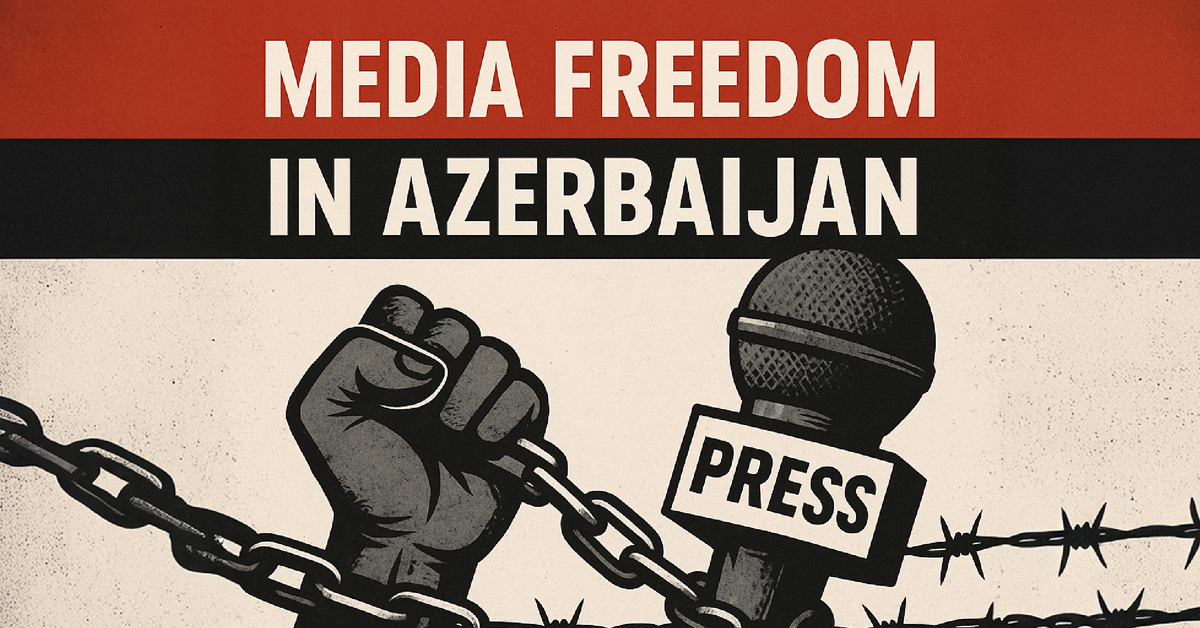“GEGHARD”
SCIENTIFIC ANALYTICAL
FOUNDATION
2026
2026
2025-07-22

During his 25 years in power, Azerbaijani President Ilham Aliyev has pursued a systematic and targeted policy of restraining and controlling the media. For the Aliyev regime, the press is viewed both as a threat to the foundations of power and as a tool for reinforcing those foundations. It is for this latter purpose that July 22 is “celebrated” in Azerbaijan as National Press Day. [1]
In the early 2000s, independent newspapers in Azerbaijan were subjected to economic pressure and fines. Later, physical violence against journalists, arrests, and, in general, the toolkit of media control became even more radicalized.
As early as 2003, Azerbaijan established the Press Council, whose stated purpose was to ensure public oversight of journalists’ compliance with the law. Since 2009, the Council has regularly published so-called “blacklists of racketeering newspapers,” accusing their editors or correspondents of allegedly violating journalistic codes of conduct. In 2010, 77 outlets appeared on the blacklist; in 2011, the number rose to 87; and in 2012, to 89.
The Azerbaijani authorities have targeted both domestic media outlets and foreign ones.
In 2009, the government banned foreign radio stations from broadcasting on FM frequencies. As a result, BBC, Voice of America, and Radio Free Europe/Radio Liberty ceased broadcasting. In 2017, most of the country’s independent news websites were blocked, including Radio Free Europe, Meydan TV, and the websites of the online channels Turan and Azerbaijan Saati, among others. According to the Azerbaijani authorities, these outlets “pose a threat” to national security, promote “violence, hatred, or extremism,” and violate the right to privacy.
Following the developments, the European Union issued a statement saying that “this decision does not align with the requirements for free, diverse, and independent media in modern and democratic societies,” and that “the EU expects Azerbaijan to fulfill its international commitments as a party to the European Convention on Human Rights, and its Article 10, on the right to freedom of expression and information.” However, such statements have little impact in preventing the further restriction of press freedom.
In recent years, numerous media outlets in Azerbaijan have been shut down one after another amid high-profile crackdowns, and journalists have been subjected to persecution. Between November 2023 and January 2024, Azerbaijani police arrested Ulvi Hasanli, director of Abzas Media; Sevinj Vagifgizi, the editor-in-chief; Mahammad Kekalov, program coordinator; as well as journalists Hafiz Babali, Nargiz Absalamova, and Elnara Gasimova. Since late 2023, authorities began persecuting the editor-in-chief of the Kanal 13 YouTube channel. Charges were later filed against journalist Shamo Eminov, and a decision was made to shut down the outlet. At the beginning of 2024, the YouTube channel Toplum.TV also came under the spotlight of Azerbaijani authorities.
In November 2024, immediately after the conclusion of the UN Climate Change Conference (COP29) in Baku, seven independent journalists were arrested. In December 2024, Meydan TV—Azerbaijan’s largest independent media outlet operating from abroad—became the main target of repression. Meydan TV's editor-in-chief, Aynur Ganbarova (Elgunesh), and five journalists were arrested. On the same day, police also detained journalist and deputy director of the Baku School of Journalism Ulvi Tahirov, as well as Kamran Mammadli, an animal rights activist.
In 2025, an Azerbaijani court sentenced a journalist from Radio Free Europe/Radio Liberty and six other individuals to prison terms ranging from 7.5 to 9 years on multiple charges. Since the end of 2023, the total number of imprisoned journalists and media workers in Azerbaijan has exceeded 25. According to the 2024 annual report by the Council of Europe’s Platform for the Protection of Journalism and Safety of Journalists, out of 159 journalists imprisoned across European countries, 30 are held in Azerbaijan.
The 2021 “Law on Media” establishes the legal grounds for controlling media outlets and journalists within the country. It introduces requirements such as media licensing, journalist registration, and inclusion in the state registry. The law effectively imposes control not only over traditional media and journalists but also over YouTube channels, bloggers, and, more broadly, social content creators. It aims not only to restrict the establishment of potential new centers of criticism but also to prevent those with prior experience in such activities from relaunching their operations.
According to the Open Observatory of Network Interference (OONI), Azerbaijan has recorded a high level of anomalous blocking and restricted access to independent websites. Between January 2022 and February 2023, access to several Russian channels was blocked. The OONI study during this period showed that the strongest signals of blocking were detected for the following domains: azerbaycansaati.tv, http://www.24saat.org, http://www.abzas.net/, www.azadliq.info, www.azadliq.org, www.meydan.tv, www.rferl.org, www.gununsesi.org, ria.ru, and www.theguardian.com. While the restrictions on the above websites have been recorded over several years, the anomaly in blocking access to The Guardian website was first detected in December 2022.
Censorship of news websites and violence against journalists in Azerbaijan are regular. Today, it is impossible to imagine the survival of the Aliyev regime without the total violation of the right to free speech. Despite Azerbaijan’s failed “branding” efforts as an advocate and leader in human rights, environmental protection, religious tolerance, and multiculturalism, the very existence of a “choking” press testifies to the deep complexities and contradictions within the Azerbaijani authorities and society.
To be continued…
[1] The National Press Day in Azerbaijan has been celebrated on July 22, since 1991